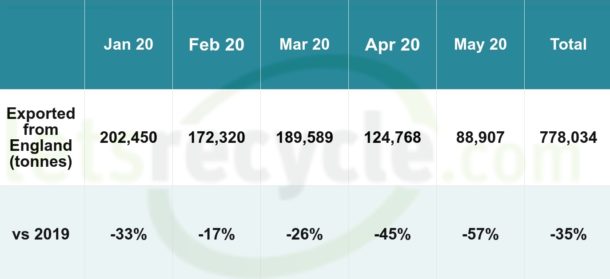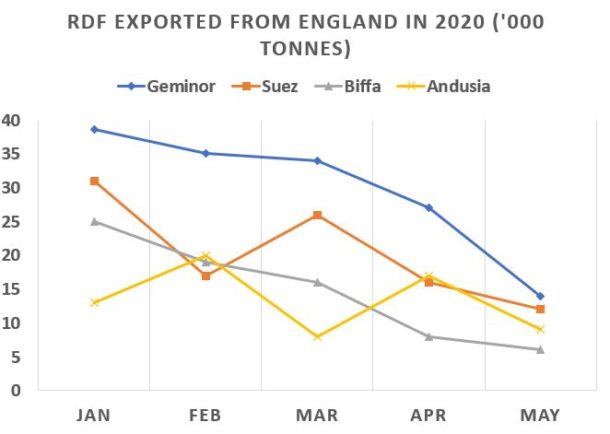The amount of refuse derived fuel (RDF) exported from England between January and May 2020 has fallen by 35% when compared to the same period in 2019.
According to provisional statistics from the Environment Agency, published on Friday (20 July), a total of 778,034 tonnes have been exported this year, down from 1,197,537 in 2019.
As outlined below, this was largely because the months of April and May 2020 saw 45% and 57% respective reductions in the amount exported when compared with last year, as the coronavirus pandemic hit the market.
Countries
So far this year, the Netherlands remains the largest importer of English RDF, with 264,330 imported between January and May 2020. However this still represents a major drop from the 576,970 from the same period as last year.
Along with the pandemic, the Dutch government also introduced a tax on RDF imported into the country, which led to Essex council deciding to landfill RDF instead (see letsrecycle.com story).
Sweden also remained a popular destination for English RDF, importing around 230,193 tonnes in the year to May. However, the tonnage dropped from 81,280 in March to 49,139 in April, when the Swedish government introduced its own tax of around £7 a tonne.
It appears Norway picked up some of this tonnage, receiving 1,367 tonnes in March and 16,663 tonnes in April.
In 2019, Sweden had imported 250,574 tonnes of RDF from England between January and May.
RDF being sent to Germany also fell dramatically after March, with 81,531 tonnes being sent between January and March 2020, falling to 12,917 in April and May. June data hasn’t been submitted to the Environment Agency yet.
Companies
As outlined below, Geminor has been the biggest exporter of RDF from England in 2020, despite a steep decline in May. The company has exported 148,880 tonnes of RDF so far in 2020.
Suez was the next biggest exporter with 102,369 tonnes, followed by Biffa with 74,464 and Andusia with 67,261.
Commercial interest
Andrew Gadd, company manager of Footprint services, said the decline isn’t necessarily bad news, although he acknowledged that it “is not in the commercial interest” of many companies.
“Waste volumes are lower because of disruption to the supply chain or construction schedules”
“What is interesting is that the drop in RDF exports is, we can presume, a consequence of the fact that the waste has not been generated, at least in part. Across the commercial and industrial sectors, waste volumes are lower because of disruption to the supply chain or construction schedules. Lockdown has served to prevent waste, which, according to the waste hierarchy, is the most favoured option,” he explained.
Mr Gadd added: “As we slowly emerge from lockdown, we are presented with a unique opportunity to celebrate the fact that there is less waste and less pollution, fewer tonnes of baled RDF being an indicator of the unexpected environmental benefit of the human response to the virus.”
The post RDF exports see sharp decline appeared first on letsrecycle.com.
Source: letsrecycle.com Waste Managment




